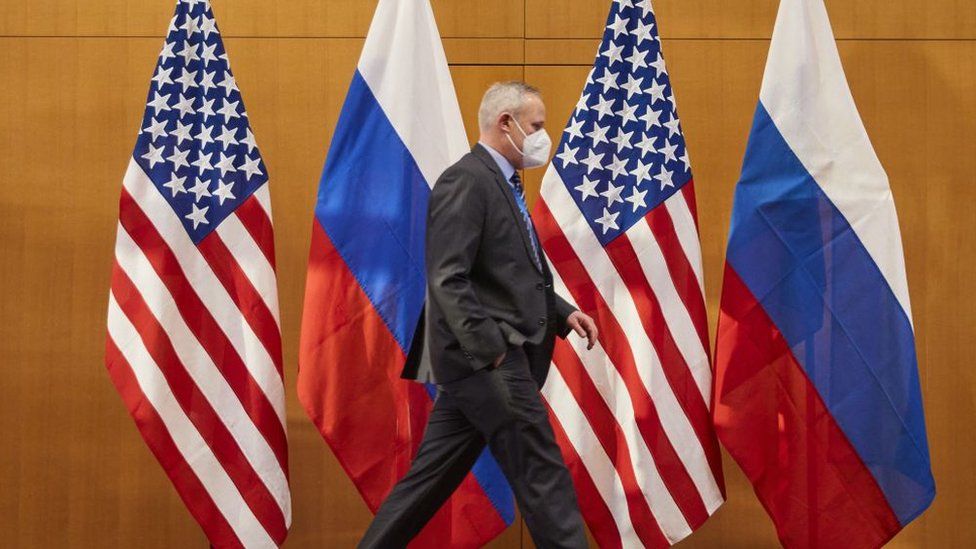Russian officials have said during high-level talks in Geneva that they have no intention of invading Ukraine, a top US diplomat says.
More than 100,000 Russian troops are said to be deployed across the border, prompting fears of an incursion nearly eight years after Crimea’s annexation.
Russia warned the US not to “underestimate the risks” involved in Moscow’s confrontation with the West.
The US has said there could be sanctions if Russia were to attack.
In a call with reporters following Monday’s meeting, Deputy Secretary of State Wendy Sherman described the talks as “frank and forthright” discussions over eight hours aimed at better understanding each side’s security concerns.
Ms Sherman said that the Russian delegation had also denied plans to invade Ukraine, saying troop movements were “manoeuvres and exercise”.
“But I would note that none of this was notified to anyone. It is typical that we notify each other’s exercises to each other where we and they can prove that they in fact have no intention by de-escalating and returning troops to barracks,” she added.
Russian Deputy Foreign Minister Sergei Ryabkov said the Russians had told their US counterparts “that all measures for the combat training of troops and forces are carried out within our territory” and that there was “no reason to fear any escalation scenario in this regard”.
Ms Sherman said the US had raised several “preliminary” ideas aimed at de-escalating tensions, including setting reciprocal limits on the size and scope of military exercises and negotiations about missile deployments.
However, Ms Sherman said that the US was pushing back on Russian proposals that were “non-starters” for the US government, including Russia’s demand that Nato commit to never include Ukraine in the alliance.
“We will not allow anyone to slam closed Nato’s open-door policy, which has always been central to the Nato alliance,” she said.
According to Ms Sherman, the US delegation told the Russians that any invasion would be met with “significant cost and consequences well beyond what they faced in 2014” when Russia annexed the peninsula of Crimea from Ukraine.
These measures could include sanctions against key financial institutions, export controls, “enhancements of Nato force posture on allied territory” and increased security assistance to Ukraine, she added.
Mr Ryabkov said the talks had been “business-like and professional” but warned the US not to “underestimate the risks” to do with the confrontation between Moscow and the West.
The Geneva talks are the first of several meetings between US, allied and Russian officials this week, which will also include a meeting at Nato headquarters in Brussels and at the permanent council of the Organization for Security and Co-operation in Europe, which includes Russia.
This video can not be played
To play this video you need to enable JavaScript in your browser.
Monday’s meeting, however, took place without the participation of US European allies, including Ukraine, prompting reassurances from Ms Sherman and other US officials that Ukraine, Europe and Nato would be included in any decisions.
Josep Borrell Fontelles, the chief coordinator and representative of the European Union’s Common Foreign and Security Policy, said on Monday he’d been told that “nothing will be agreed without our strong cooperation, coordination and participation”.


Russia has repeatedly denied it has any plans to launch a military operation in Ukraine. Last month, the Russian government published a series of demands including a commitment that Ukraine will never join Nato.
Mr Borrell warned that he believes that a Russian invasion is still possible. “There are 100,000 Russian troops on the other side of the border,” he said. “I suppose they haven’t gone there to drink coffee!”


























